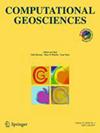基于非线性域分解预处理的地下流鲁棒高效场尺度模拟
IF 2
3区 地球科学
Q3 COMPUTER SCIENCE, INTERDISCIPLINARY APPLICATIONS
引用次数: 0
摘要
摘要讨论了一种基于加性Schwarz预条件精确牛顿法(ASPEN)的多组分多孔介质流动全隐式模拟的非线性域分解预处理方法。该方法通过解决局部阶段的不平衡非线性和全局阶段的远程相互作用,有效地加速了非线性收敛。与标准牛顿相比,ASPEN可以提高鲁棒性并显著减少全局迭代的次数,但是在局部步骤中引入的额外工作使每次全局迭代的成本更高。我们讨论了地方和全球阶段的实施方面。我们展示了如何将全局雅可比矩阵转换为与完全隐式系统相同的形式,从而可以使用标准的线性预调节器和解算器。我们在一系列测试用例中比较了ASPEN与标准牛顿的计算性能,从具有简化几何或流物理的概念用例到代表实际资产的用例。我们的总体结论是,当该方法工作良好并在几次迭代中收敛时,ASPEN的性能优于Newton。另一方面,ASPEN避免了时间步的削减,并且在时间步上的运行时间明显更短,这是Newton难以做到的。因此,在整个模拟过程中自适应地在Newton和ASPEN之间切换是提高计算速度的一个好方法。本文概述了几个切换策略的示例。本文章由计算机程序翻译,如有差异,请以英文原文为准。
Nonlinear domain-decomposition preconditioning for robust and efficient field-scale simulation of subsurface flow
Abstract We discuss a nonlinear domain-decomposition preconditioning method for fully implicit simulations of multicomponent porous media flow based on the additive Schwarz preconditioned exact Newton method (ASPEN). The method efficiently accelerates nonlinear convergence by resolving unbalanced nonlinearities in a local stage and long-range interactions in a global stage. ASPEN can improve robustness and significantly reduce the number of global iterations compared with standard Newton, but extra work introduced in the local steps makes each global iteration more expensive. We discuss implementation aspects for the local and global stages. We show how the global-stage Jacobian can be transformed to the same form as the fully implicit system, so that one can use standard linear preconditioners and solvers. We compare the computational performance of ASPEN to standard Newton on a series of test cases, ranging from conceptual cases with simplified geometry or flow physics to cases representative of real assets. Our overall conclusion is that ASPEN is outperformed by Newton when this method works well and converges in a few iterations. On the other hand, ASPEN avoids time-step cuts and has significantly lower runtimes in time steps where Newton struggles. A good approach to computational speedup is therefore to adaptively switch between Newton and ASPEN throughout a simulation. A few examples of switching strategies are outlined.
求助全文
通过发布文献求助,成功后即可免费获取论文全文。
去求助
来源期刊

Computational Geosciences
地学-地球科学综合
CiteScore
6.10
自引率
4.00%
发文量
63
审稿时长
6-12 weeks
期刊介绍:
Computational Geosciences publishes high quality papers on mathematical modeling, simulation, numerical analysis, and other computational aspects of the geosciences. In particular the journal is focused on advanced numerical methods for the simulation of subsurface flow and transport, and associated aspects such as discretization, gridding, upscaling, optimization, data assimilation, uncertainty assessment, and high performance parallel and grid computing.
Papers treating similar topics but with applications to other fields in the geosciences, such as geomechanics, geophysics, oceanography, or meteorology, will also be considered.
The journal provides a platform for interaction and multidisciplinary collaboration among diverse scientific groups, from both academia and industry, which share an interest in developing mathematical models and efficient algorithms for solving them, such as mathematicians, engineers, chemists, physicists, and geoscientists.
 求助内容:
求助内容: 应助结果提醒方式:
应助结果提醒方式:


